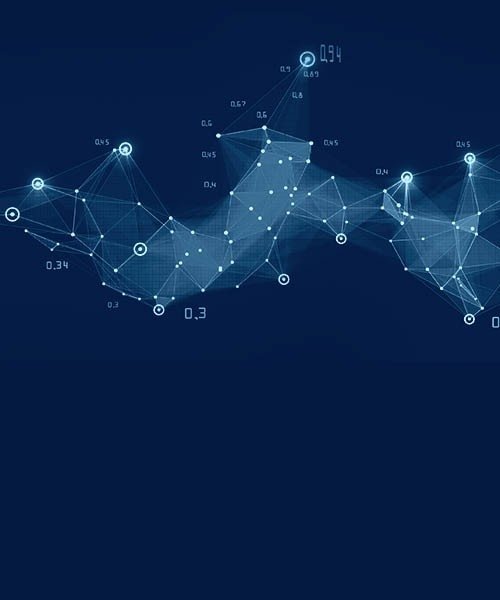






DataOps
Business Empowerment through the Data Lifecycle
Data is the lifeline of your business. Enterprise data exists in silos that are detrimental to your teams and for achieving business objectives. With the competition rising consistently, it is essential to tune into your business lifeline and make your data work for you.
DataOps increases your enterprise’s adaptability to change, mitigate risks, and optimize costs, and this is possible by breaking down silos, improving collaboration, and ensuring data quality. It transforms data into a strategic asset, aligning with business objectives and driving competitiveness in dynamic
markets.
DataOps helps build a robust process that can channel volumes of data efficiently. It has a proven record of facilitating sustained growth, reducing downtime and operation costs, and eliminating risks, all while effectively working through the data lifecycle.

Accelerated Development with CanData.ai
Our services successfully and consistently address common pain points associated with enterprise data. These include inefficient data generation,
processing issues, and poor quality of data due to inconsistencies.
Further, we establish sound data management and governance measures to create effective data pipelines to generate business insights quickly. We make
this possible through seamless integration and introduction of data-driven culture with your enterprise. Our team of experts effectively deliver quick wins
and increase ROI by leveraging an Agile framework, our design-thinking approach and a feedback reliant development process.
We are determined to empower your organization by revolutionizing the data
practices, fostering real-time decision-making, efficient data management, and
reduced time-to-insight.
Take the first step towards introducing DataOps today.
From Raw Data to Real-Time Intelligence
Whether it’s deploying ML models in sandboxed environments or fueling BI dashboards with live insights, our infrastructure guarantees secure, scalable, and repeatable pipelines. The result? Operationalized AI systems, accelerated innovation, and smarter decision-making, all underpinned by continuous feedback loops and governance.
Fusing Data Excellence with Operational Mastery
Bridges the gap between data development and operations,
streamlining data flow for faster insights and smoother analytics, all with automation and collaboration.
- Data Ingestion
- Data Transformation and Processing
- Data Integration
- Data Quality Management
- Data Warehouse Management
- Data Lake Implementation and Management
- Data Lifecycle Management
Core Components of DataOps Services

Data Ingestion
Involves the use of automated processes and tools to streamline and accelerate tasks such as data integration, testing, validation, and deployment.

Data Transformation& Processing
Incorporates continuous integration practices, similar to those in software development, to merge code changes regularly, ensuring the smooth and consistent integration of data processes.

Data lake implementation
Extends continuous integration by automating the deployment of data pipelines, allowing for quicker and more reliable delivery of data to end-users.

Data Quality management
Utilizes version control systems to manage changes to code, configurations, and other artifacts, ensuring traceability and reproducibility of data processes.

Data Warehouse Management
Implements robust monitoring and logging systems to track the performance of data pipelines, detect issues, and gather insights into the behavior of the data processes.

Agile Methodologies
Applies Agile principles, such as iterative development and flexibility in responding to changing requirements, to data-related projects and processes.

Data Lifecycle management
Establishes mechanisms for gathering feedback from users, monitoring systems, and stakeholders to continuously improve and optimize data processes.
End-to-end solutions for your Enterprise Data
Our team of DataOps experts craft customized solutions where data
helps both your business and your people.
DataOps
Implement IDEA for DataOps success
- Inception
- Direction
- Execution
- Acceleration
Initially, we familiarize ourselves with the data ecosystem and understand the goal that your business is working towards. We do so by taking into account the current state of your enterprise, empathize with the problems you aim to address, and then chart a roadmap with inputs from all stakeholders.
Based on the requirements, we undertake initiatives to experiment and suggest an apt solution for your enterprise. The solution is designed after a short experimentation phase following which we finetune the solution for your business.
In this phase, we help build the data pipeline. We consolidate, transform, ingest the data and introduce it to a data system. Next, the data pipeline is automated to simplify the extraction of insights.
In the final stage, we implement measures to assure sustained benefits from DataOps services ensuring an optimized and improved Data Governance system.
F. A. Q
DataOps FAQ
In the data management process, DataOps can enable organizations to identify the kind of data that can be valuable so that they don't spend time later sorting through it for quality. DataOps can also help teams communicate effectively and have access to analytics that are more efficient and accurate.
DataOps removes redundancies withinside the statistics cloth and guarantees operational efficiency.In fact, DataOps offers companies the gain of an easy transition to the cloud that permits higher virtual transformation strategies.
The goal of DataOps is to manage data in alignment with business goals.If the aim is to elevate the lead conversion rate, for example, DataOpsmight function statistics to make hints for advertising merchandise better, as a result changing extra leads.
Implementing DataOps within an organization requires a strategic approach, starting with the definition of clear business objectives and a commitment to fostering a data-driven culture. A thorough assessment of the current state, coupled with skills development and technology selection, sets the foundation. Pilot projects allow for iterative learning and adjustments before scaling up. Robust data governance and security measures, along with continuous monitoring and metrics, ensure data quality and compliance. Communication and training are critical for stakeholder engagement, and a phased, iterative approach supports gradual scaling. The emphasis on continuous improvement, feedback loops, and a collaborative mindset contributes to the successful transformation of data practices, aligning them with overall business goals.
The technology stack for DataOps involves a combination of tools and platforms that facilitate the integration, automation, monitoring, and management of data pipelines and operations.
Here's a list of advanced technologies commonly used in DataOps: Data Integration: Apache NiFi, Talend, Apache Kafka Automation and Orchestration: Apache Airflow, Jenkins, Luigi Containerization and Orchestration: Docker, Kubernetes Configuration Management: Ansible, Puppet, Chef Continuous Integration/Continuous Deployment (CI/CD): Jenkins, GitLab CI/CD, CircleCI Monitoring and Logging: ELK Stack (Elasticsearch, Logstash, Kibana), Prometheus, Grafana, Splunk Data Catalog and Metadata Management: Collibra, Alation, Apache Atlas Data Virtualization: Denodo, Red Hat JBoss Data Virtualization Metadata Repository: Apache Atlas, IBM InfoSphere Information Governance Catalog.
To efficiently implement DataOps in an organization, key tasks include defining objectives aligned with business goals, fostering a data-driven culture, conducting a thorough assessment, upskilling teams through targeted training, selecting appropriate technologies, establishing robust data governance, piloting projects to gather insights, implementing automation and orchestration, integrating collaboration tools, setting up monitoring systems, fostering a culture of continuous improvement, managing change effectively, documenting processes, and gradually scaling up practices based on successful pilot Ongoing training and support are crucial to ensure sustained success, driving improved data management and operational excellence.
DataOps Engineer, Data Architect, Data Integration Specialist, DevOps Engineer, Cloud Engineer, Monitoring and Logging Specialist, Machine Learning Engineer, Data Governance Manager, Data Analyst.

Any questions you want to ask?
Donec ipsum dapibus interdum si metus aenean. Pede dis ligula torquent ac senectus.
